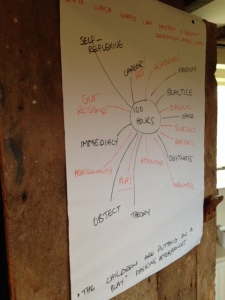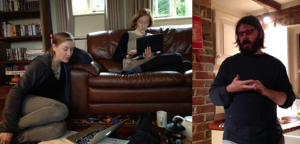Kate Smith on the 100 Hours Writing Weekend – 21-23 November 2014
Are we there yet?
On Friday 21 November members of the 100 Hours project came together in a small village in Sussex. Two days later the group left. Between arriving and leaving the group ate five meals, made two Skype calls, maintained silence for twenty minutes and wrote around 3000 words. The words were important, but the process of writing was more so.
The 100 Hours group last met in early August to discuss the outcomes of the forum they had held at UCL on 20 June. The Forum had proved fruitful in underlining the multiplicity of responses created by all those in the project. Invited delegates from disciplines such as art history, anthropology and history, and curators of collections ranging from old master drawings to natural history generously offered comments, critiques and suggestions. One thread from these discussions was that the project, although innovative had not done enough to challenge traditional formats of presentation and writing. Another was that the project should consider what it is not just to think and discuss together but also to write together. When we met in early August it was this suggestion that we were particularly keen to act upon. So on Friday 21 November six members of the group found themselves travelling into Sussex to the village of Kirdford.
We began by discussing Lisa Ede and Andrea Lunsford article entitled ‘Collaboration and concepts of authorship’.* In the article Ede and Lunsford argue that the ‘everyday practices in the humanities continue to ignore, or even to punish, collaboration while authorizing work attributed to (autonomous) individuals’.** These authors don’t advocate that scholars should now all shift over to a collaborative model of knowledge production, but rather that the material, institutional and cultural barriers to collective work should be identified and challenged. What then are the barriers and how can we begin to recognise them? How are those barriers heightened when collaborative research also tries to overcome disciplinary boundaries? The group sought to explore how collaborative writing might operate through a series of experiments. First, we wrote a sentence with no fixed topic by each member contributing one word at a time. Second, we constructed a sentence where each member had a topic in mind and then offered a word each to try to shape the sentence towards their topic. Finally, we tried to write a sentence on a particular topic. Experimenting with these processes raised multiple questions and led us to begin listing and discussing different words and themes connected with the 100 Hours project.
Our next task was to take these discussions and the list we had constructed and to each write a paragraph in twenty minutes. The discipline of sitting silently and simply writing changed the tone and everyone studiously focused on their laptops. What emerged from a very simple exercise was in some cases (not my own unfortunately!) brilliantly pertinent. At this point we broke for lunch and took advantage of having the time to reflect on the exercises we had completed and what they might mean for the project. It also offered us time to begin to consider what we imagined the final ‘output’ of the project might be. Leonie and I have decided to write a journal article about the methodology of the project, but we would also like to publish a more collaborative piece on the project’s findings. We want to create something that reflects the discussions of the project and which is innovative and playful in form as well as matter. It also seems important that this output pushes at the boundaries of traditional academic publishing. After prolonged discussions we hit upon an idea and Skyped two members of the group who are currently in the United States. Discussing our ideas with Liz Haines and Emily Orr proved helpful and the final hours of the day were spent writing up a proposal and finessing our plans.
We learned much from the weekend, but one of the really important takeaway points was that collaboration requires presence and time. Speaking to each other and having the time to dwell and interrogate together is crucial. Once we’ve done that a little more then we’ll let you know our next steps.
* Lisa Ede and Andrea A. Lunsford, ‘Collaboration and concepts of authorship’, PMLA, 116:2 (2001), pp. 354-369.
** Ede and Lunsford, ‘Collaboration and concepts of authorship’, p. 357.



Exciting!
Just one hour to go … it’s getting very exciting! All the best to the team today